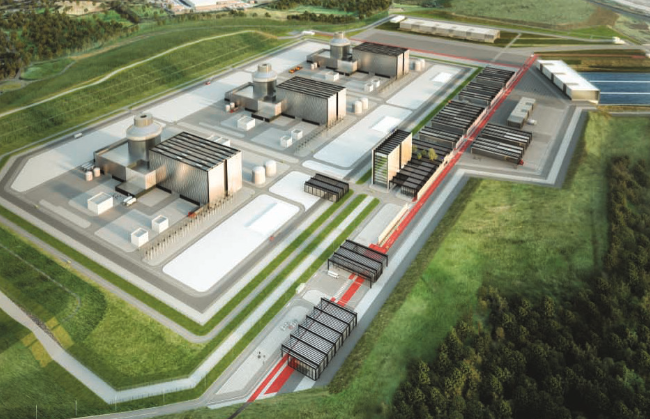Local leaders vow to fight on as Toshiba quits Moorside
The long-troubled £10bn Moorside nuclear power project in Cumbria looks in grave danger following the announcement by Toshiba that it is to wind up the project’s development vehicle NuGeneration.
NuGen, originally a joint venture between Toshiba and Engie, was originally intended to be operational at Moorside by 2025, but the project was put up for sale last year after Toshiba was forced into a position of sole ownership by Engie’s withdrawal.
Beating off a Chinese rival, Korean Electric Power Corporation was named in December 2017 as preferred bidder, but talks collapsed, leading Toshiba, which had reduced NuGen’s headcount by 60% in September, to announce the wind-up of the business from early 2019.
A statement from Toshiba said: “After considering the additional costs entailed in continuing to operate NuGen, Toshiba recognises that the economically rational decision is to withdraw from the UK nuclear power plant construction project, and has resolved to take steps to wind-up NuGen.”
Lord Inglewood, chairman of Cumbria Local Enterprise Partnership, said: “This is clearly disappointing news and Cumbria LEP will continue working with all of our local partners, including our MPs, to promote the importance of Moorside nationally and internationally and to identify alternative nuclear new build options for this nationally important site.”
The LEP’s chief executive Jo Lappin added: “This is a sad day for the employees of Nugen, who have worked tirelessly to take the Moorside project forward. Whilst disappointing, Moorside remains designated as a site for nuclear new build and here in Cumbria we have world-leading expertise to take this forward.
“We recognise the challenges presented for the NuGen project, however the development of a new nuclear power station at Moorside has the potential to supply up to 7% of the UK’s electricity and create thousands of new jobs and therefore remains nationally important.”
Guy Lawson, director of the Civil Engineering Contractors Association, said: “The area is home to the UK’s greatest concentration of companies and workers with genuinely world-leading capability in nuclear delivery and operation. It is essential that this competitive advantage is maintained through sustained investment.
“With Toshiba’s decision now made, we call on the Government to act promptly, working with industry to consider how the Moorside project can continue.”
Trade union GMB, which has long argued that Government should take a stake in the Moorside reactor, called for the Nuclear Decommissioning Authority to be scrapped and replaced by a re-tasked Nuclear Development Agency. National secretary Justin Bowden said: “Relying in this way on foreign companies for our country’s essential energy needs was always irresponsible.
“Add to that the multiple opportunities to step in and take control, that were missed or ignored. In the wreckage that passes for a joined up UK energy policy, the question now is whether government has finally learned the mistakes of Moorside?
“A new nuclear power station in West Cumbria remains vital for the UK’s future energy security and requires urgent action: the Nuclear Decommissioning Authority must be immediately given a role for nuclear development and tasked with developing a small modular nuclear reactor on site.”
The Department for Business, Energy & Industrial Strategy insisted though that private sector developers must lead the way. A BEIS spokesperson said: “We understand that Toshiba have faced a difficult decision in ending their involvement in new nuclear projects outside of Japan.
“Nuclear has an important role to play as part of the UK’s diverse energy mix as we transition to a low carbon economy, but in each case projects must provide value for money for consumers and taxpayers. This Government remains committed to new nuclear through the Industrial Strategy Nuclear Sector Deal as well as consenting the first new nuclear power station in a generation at Hinkley Point C.”
Even if Moorside can be resurrected, its construction will inevitably be delayed beyond 2025. The use of Toshiba’s AP1000 reactor technology on the project has regulatory approval, but if an alternative operator proposes a different design, a renewed approval could take up to four years, it is understood.
The Moorside project has also been a factor in planned infrastructure investments in Cumbria, including a major overhaul of stations at Corkickle and Mirehouse, new railway lines including a 285m extension to the St Bees Loop, and a marine off-loading facility.
Engie withdrew from the project in April 2017, exercising its right by the JV agreement to force the partner to buy it out in the event of a default – this had been triggered when Toshiba put its nuclear subsidiary Westinghouse into bankruptcy protection.




